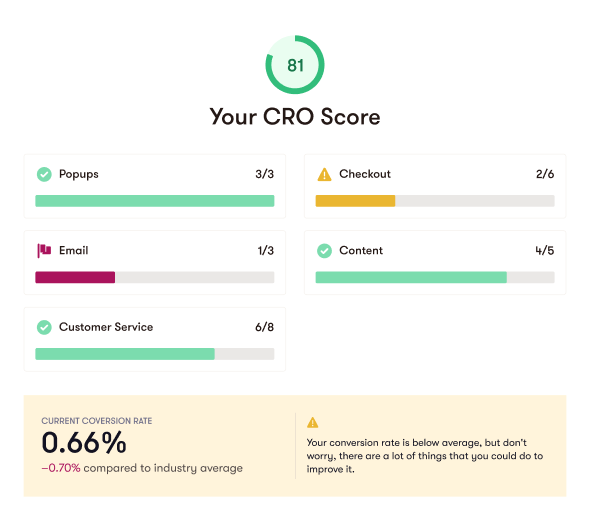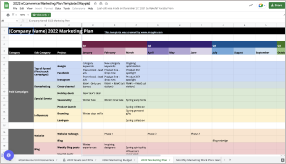
Selling on Amazon vs. Your Own Ecommerce Store
Learn all the pros and cons of selling on Amazon versus on your own eCommerce store. Here is how you to take advantage of both and boost your eCommerce sales.
DOWNLOAD TEMPLATEEcommerce has had a great year. Last year, due to Covid-19, the eCommerce sector saw a radical rise in its share of all retail sales, from 16% to 19%. But not every store benefited from the growth.
Amazon’s net profit grew 84% in 2020 with sales hitting $386B. Sales certainly became more centralized and favorited the large online players - like Amazon and Walmart - because of their logistics and government contracts.
Research shows that half of the online spending takes place on online marketplaces, and might increase to two-thirds in the next five years. The question for most eCommerce owners becomes - should they continue to sell on their site directly or work on expanding to Amazon and other large marketplaces?
In this article, we break down the pros and cons of selling on Amazon versus selling on your own site, to settle this question once and for all.
Let’s dive in.
[Add Banner Here]
Selling on Amazon
Amazon is by far the largest marketplace and has become the world’s leader in eCommerce. Studies show that over 66% of product searches originate on Amazon. Selling on Amazon is pretty straightforward. To become a seller, you need to create an Amazon seller account, then list all of your products, and—voila! You are ready to sell. You can sell your own products or source products online and make money on the difference in prices.
Studies show that 89% of US customers say that they are more likely to buy products from Amazon than any other eCommerce site. Amazon is a highly trusted brand in the US, superior in its customer service and delivery.

Pros of selling on Amazon
Here are some of the advantages of selling your products on Amazon.
Easy access to a wide customer base
Amazon had 150.6 million mobile users accessing their app in September 2019. Also, there are currently over 150 million Amazon Prime members. After the drastic rise in eCommerce sales last year, this number is now even higher.
With over 197 million monthly users, Amazon provides a great opportunity to reach new and first-time customers and grow your audience much quicker than on your own eCommerce site.

No upfront costs
There are no upfront costs when selling on Amazon. You don’t need to set up your own site, pay for hosting, design, or marketing tools. Amazon already has everything you need to set up your storefront.
All you've got to do is create your product listings and start selling. The only thing you have to pay upfront is the membership fee which is $39.99 per month on the professional seller plan. Individual sellers only pay $0.99 every time an item is sold.
Amazon does the storing, packaging, and delivering
Through the Fulfillment by Amazon (FBA) program, Amazon takes over the responsibility of storing your products, stocking them, and even delivering them for a small fee. Amazon shipped over 5 billion items in 2017.
You don't need to have a warehouse and full-fledged packaging and shipping services in place. With Amazon’s fulfillment centers around the country, logistics is one big problem that you don't have to worry about.

The FBA program is a game-changer for many businesses as it decreases the upfront costs of running an eCommerce operation even more, and really takes out any barriers of entry that previously existed. You do have other fulfillment options if you want to use your own fulfillment services or your own house, that’s always an option.
Built-in marketing
Amazon marketplace runs marketing and retargeting campaigns for you, and does all your search engine optimization (SEO), so you don’t have to invest in your marketing infrastructure. (For more complex projects, you can always hire an Amazon marketing agency).
The online marketplace sends out shopping cart abandonment campaigns, incentives, and promotions on your behalf. So you don’t have to get any external marketing tools.

Robust advertising platform
Amazon’s advertising platform is one of the most well-developed in the world. Amazon offers a wide variety of ad types such as video ads, audio ads, sponsored brands, display ads, Amazon sponsored products, Amazon PPC, and even live-streamed ads. Amazon’s Seller Central is really intuitive and easy to use.

International reach
Another major advantage of selling on Amazon is that you can easily expand to other markets around the world. Amazon is available in 58 countries around the world with a reach of 1.2 billion people.

Amazon Prime Day
Each year, millions of customers shop on Amazon for Amazon’s Prime Day. Total sales amounted to $10.4 billion in 2020, with over 64% of consumers planning to shop on Prime Day this year. It’s a 48-hour event that provides eCommerce business owners an excellent opportunity to get a surge of sales and grow their business.

Cons of selling on Amazon
High competition
The competition on Amazon is very high. The platform has 6.3 million online sellers worldwide. Many sellers including giant retailers and companies sell their products on Amazon. In many categories, the competition is incredibly high. If you're not careful with product selection, your products may end up never being seen by customers.
There are also lots of Chinese sellers that tend to copy products and sell them for much cheaper. So you always have to differentiate yourself and work hard at making sure you get 5-star reviews every single time.
High fees and low margins
Amazon charges a CPA fee, usually in the range of 8% to 15%, for each sale. The percentage varies based on the product category. This fee can go as low as 8% (for personal computers) and as high as 45% (for Amazon Device Accessories).
After the seller fees, taxes, FBA fees (if you’re using FBA), and advertising costs, you’re left with small profit margins on each item.
Violating Amazon's rules can get you suspended
Amazon has clear rules in place to maintain a safe and enjoyable experience for buyers. The company will suspend online sellers if they violate any of their five community rules and you can lose your entire Amazon business. Sometimes these violations can be out of your control.
For example, a competitor could make false infringement accusations, leading Amazon to suspend your listing and open a case against you. Your listing could be inactive for weeks until the case is closed.
Another important rule is that you’re not allowed to provide your customers with your contact information, and one small mistake here could get you banned permanently.

Selling on your eCommerce store
Building your eCommerce store can be a big step in the right direction to grow your business. It might sound intimidating, but it doesn't have to be. You can use an eCommerce platform like Shopify or BigCommerce and set up your store in minutes.
The work you put into each product listing is similar to what you would do on Amazon. You then have full control over the customer experience. You can dedicate as much time and effort into each customer relationship, create your own referral or rewards program to increase customer loyalty, and focus on your own advertising efforts.
Pros of selling on your eCommerce store
Here are some of the top benefits of selling on your own eCommerce store.
Build your brand awareness
A professional website can help in building your brand's credibility. It builds trust with customers and makes them feel more comfortable buying your products. Additionally, you can tell your brand's story on your website to create a positive image that resonates with your customers.
Another huge benefit of selling on your own eCommerce site is that you are in full control of your customer data. You can build your email list and communicate with customers directly.
You can also retarget your visitors and leads through any number of omnichannel strategies such as text messages (SMS), push notifications, email campaigns, Messenger chat messages, or social media ads.

Less pesky competitors
A huge advantage to having an eCommerce store is that visitors to your website can only buy your products. You won’t lose sales to competitors who could be selling that item for a lesser price, like on Amazon. You also have control over your prices, which results in higher profits over time.
No listing or referral fees
Selling on your own website means freeing yourself from listing or referral fees. You only need to pay tax on sales, credit card fees, and the price of the software, like Shopify, on which your online store is set up. There are no selling limits on how many items you could sell per month and no extra selling fees.
Full control over the user experience
Having your own online store gives you full flexibility on the look and feel of your site. You can sell physical products as well as digital products, you can customize your product page design as well as the design of your UGC and product reviews, and receive a large profit from each product listing.
You can also offer 3rd-party payment and checkout options using the Shopify payment system like Google Pay, Apple Pay, and Paypal.

More advertising options and revenue streams
When you’re selling on Amazon you can’t really advertise your Amazon listings anywhere. The eCommerce giant already does their own advertising on Google through things like Google Ads and Google Shopping.
If you sell on your own site, however, the world of advertising becomes open to you. You can use social media advertising, influencer ads, video ads, Google Shopping campaigns, and much more. And you don't have to compete against your own Amazon listings for a spot in search results.
Cons of selling on your own eCommerce store
Here are some disadvantages of selling in your own store.
Cost of setting up the website
Setting up your website can involve shelling out cash, but the amount depends on how you decide to go about it. For example, using a website builder or CMS (like Shopify or BigCommerce) to build the store yourself is way cheaper than getting a web design agency to make your website from scratch.
Other software costs come to mind as well like hosting, an email marketing service for your email campaigns, analytics tools, and other marketing plugins.
Lack of traffic in the initial days
When you start, your eCommerce website will have low traffic. It takes time and effort to rank high on search engines like Google.
Once you have a loyal customer base and a good amount of qualified traffic coming to your store, your business will start taking off, but it takes some time. Search engine optimization for eCommerce is hard and takes time to bring results.
Pro tip: we’d recommend diversifying and selling your products on multiple Amazon competitors (like Houzz, eBay, Walmart) to maximize your brand exposure.
Costly advertising
PPC ads can be extremely helpful for your online business if used correctly, but they can also take a huge chunk out of your budget. Running ads for a wider population on search engines like Yahoo or Google can often have much lower conversion rates.
Facebook ads tend to get very expensive and without a proper advertising strategy, you might waste a lot of your marketing dollars without seeing results. Amazon ads are much cheaper and easier to set up.
Need of customer service
Customer service is super important for the success of any eCommerce brand and if you are running your own store then you will have to invest more time and resources to build your customer success team.
As an eCommerce store owner, performing customer service and running all other operations of your business simultaneously can be difficult. You need a team in place for customer complaints, technical issues, and more. And that is a disadvantage of selling products on your own site, versus on a selling platform like Amazon.
Conclusion
When it comes down to deciding where to sell your products, you need to consider your niche and the amount of time and money you’re willing to invest. Before settling on either Amazon or your own eCommerce store, you must weigh the pros and cons of both.
And who said you have to choose between the two anyway? You could leverage your success using both to build a well-balanced eCommerce business. You could begin by selling your private label on Amazon and later shift your business to an eCommerce store as your products become more popular.
If you need any help sourcing products and finding out what is popular on Amazon check out AMZScout. It’s a tool that offers a complete toolset that helps you in finding profitable low competition products, sourcing from local and international suppliers, and discovering popular product keywords.
















